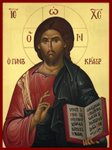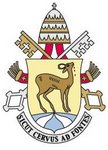 Whooops. I made a terrible blogger's error. I assumed that people would have read the post prior (and related) to this one explaining this series I am doing. Bad Blogger!! I apologize. The references below are all from Ratzinger's book Jesus of Nazareth. See this blog to understand what I am attempting here. Again, sorry for any confusion.
Whooops. I made a terrible blogger's error. I assumed that people would have read the post prior (and related) to this one explaining this series I am doing. Bad Blogger!! I apologize. The references below are all from Ratzinger's book Jesus of Nazareth. See this blog to understand what I am attempting here. Again, sorry for any confusion. Before we begin the ascent of the Mountain of Temptation it is important to remember where Jesus is immediately coming from, viz., his baptism. It was a moment of tremendous importance for Jesus' life. He had just spent the prior 30 or so years in quiet, humble obedience to Mary and Joseph as he "increased in wisdom and in stature , and in favor with God and man" (Luke 2:52). Now he has been called to his public ministry: at once the Anointed One (Messiah) and ultimately the Suffering Servant. His entrance into public life is an entrance into the life of the world. We have to keep in mind that nothing in Jesus' life was accidental; it was a completely intentional life. Jesus willed his life in complete submission to his Father's will. So often life happens to us and we react to life rather than respond. We are scattered and dull; thus, so much escapes us. Not Jesus, however. He was drawn by the Father's will to the Jordan where John the Baptist was baptizing there for the forgiveness of sins. John was the "voice crying out in the wilderness: Prepare the way of the Lord, make his paths straight" (Matthew 3:3). John was baptizing at the Jordan one day when the unthinkable happened; He - the One who would baptize with water and Spirit came to be baptized!!
John would have prevented him, saying, "I need to be baptized by you, and do you come to me?" But Jesus answered him, "Let it be so now; for thus it is fitting for us to fulfill all righteousness." Then he consented. And when Jesus was baptized, he went up immediately from the water, and behold, the heavens were opened and he saw the Spirit of God descending like a dove, and alighting on him; and lo, a voice from heaven, saying, "This is my beloved Son, with whom I am well pleased." Matthew 3:14-17
Ratzinger tells us that the word "righteousness" here is to mean: "an unrestricted Yes to God's will and an obedient acceptance of his yoke" (p. 17). He continues on to make a very important point. This act was Jesus, already, identifying himself with sinners by taking their sins upon himself and then into the waters of the Jordan thereby anticipating the Cross as the Suffering servant:
Jesus loaded the burden of all mankind's guilt upon his shoulders; he bore it down into the depths of the Jordan. He inaugurated his public activity by stepping into the place of sinners. His inaugural gesture is an anticipation of the Cross (p.18)
The Old Testament Scriptures tell us this about the Suffering Servant (there are four Suffering Servant songs. Isaiah 42:1-7; 49:1-6; 50:4-9; 52:13-53:12):
But he was wounded for our transgressions, he was bruised for our iniquities; upon him was the chastisement that made us whole, and with his stripes we are healed. All we like sheep have gone astray; we have turned every one to his own way; and the LORD has laid on him the iniquity of us all...Yet it was the will of the LORD to bruise him; he has put him to grief; when he makes himself an offering for sin, he shall see his offspring, he shall prolong his days; the will of the LORD shall prosper in his hand; he shall see the fruit of the travail of his soul and be satisfied; by his knowledge shall the righteous one, my servant, make many to be accounted righteous; and he shall bear their iniquities. Therefore I will divide him a portion with the great, and he shall divide the spoil with the strong; because he poured out his soul to death, and was numbered with the transgressors; yet he bore the sin of many, and made intercession for the transgressors. Isaiah 53:5-6, 10-12
Thus, we see in Jesus first public action an embracing of the Father's will in its fullness: the Messiah, the Anointed One, the King will rule through the depths of self-emptying love which takes on Itself the entirety of human sin and misery. An understanding of Jesus' baptism, where he is the Anointed Messiah and takes upon himself our sin, is crucial in understanding the Mountain of Temptation. Ratzinger states:
The conclusion of the baptismal scene tells us that Jesus has received this true "anointing", that he is the Anointed One - that at that moment kingly and priestly dignity were formally bestowed on him for all time in the presence of Israel." p. 26
What can we see in this that relates to our own life? First, that when we are baptized we are baptized into the death of the Lord, and, as we come up from the waters, we come up into his Resurrected Life. We, too, anticipate our Crosses in life as we are plunged into the baptismal waters that at once bring death and give life (Cf. Catechism of the Catholic Church #1227). Thus, we must accept and even embrace the Cross; for Christianity ceases to exist without the Cross. Second, we are anointed as "little Christ's". The term "Christian" primarily means "anointed". Hence, we share in the Christ's Messianic mission to go and preach the Good News (Gospel) to the world. We are anointed by the Holy Spirit to go forth in power and charity into the world. Third, if we share in the anointing we must also share in the other aspect of the Messiah - the suffering servant. The suffering and sacrifice that is constitutive to charity we must not shrink from but embrace it as he did. We do this only through the power of God imparted to us through the grace received by our anointing. It is love and obedience to the end, the royal road that Jesus showed us, that will please the Father and bring about the Reign of God. Last, we must lay down our pride and allow God to call us to where he might. It didn't make sense that Jesus, the Perfect One, should be baptized - even to John. Jesus obeyed and so must we. All too often we ignore the promptings of the Holy Spirit because it does not fit into our perceptions of what God should or shouldn't call us to. We must be open and willing to follow Christ wherever, whenever, and however he calls...
Next time, we will ascend the Mountain of Temptation and see that Jesus' temptations are ordered to his mission as Messiah, and if it is the case for him, then it is the case for us.



2 comments:
Mike I read your post from Aug 8th. I have ordered the books you recommended and would like to know which text you are referring to? If you could just footnote these that would be helpful. I LOVE the book "The Lord" it is awesome. I am still waiting on the others to arrive.
Sorry, Rebecca. All the references in this blog are from Ratzinger's Jesus of Nazareth. This blog should explain the context of this post.
Thanks for reading!! (and commenting!!)
Post a Comment